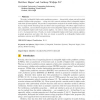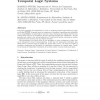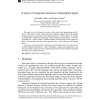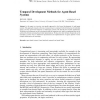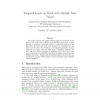200
click to vote
FSTTCS
2010
Springer
14 years 11 months ago
2010
Springer
We study (collapsible) higher-order pushdown systems -- theoretically robust and well-studied models of higher-order programs -- along with their natural subclass called (collapsi...
128
click to vote
JAPLL
2010
15 years 14 days ago
2010
We show that problems arising in static analysis of XML specifications and transformations can be dealt with using techniques similar to those developed for static analysis of pr...
114
click to vote
IGPL
2002
15 years 1 months ago
2002
This paper generalises and complements the work on combining temporal logics started by Finger and Gabbay [11, 10]. We present proofs of transference of soundness, completeness an...
113
click to vote
AAMAS
2004
Springer
15 years 1 months ago
2004
Springer
In this paper we overview one specific approach to the formal development of multi-agent systems. This approach is based on the use of temporal logics to represent both the behavio...
113
click to vote
INFORMATICALT
2007
15 years 1 months ago
2007
In this paper we consider branching time temporal logics of knowledge and belief. These logics involve the discrete time linear temporal logic operators “next” and “until” ...
126
click to vote
ENTCS
2007
15 years 2 months ago
2007
Temporal logics of knowledge are useful for reasoning about situations where the knowledge of an agent or component is important, and where change in this knowledge may occur over...
117
click to vote
ENTCS
2006
15 years 2 months ago
2006
Temporal logics are well suited for the specification and verification of systems of communicating agents. In this paper we adopt a social approach to agent communication, where c...
114
click to vote
APAL
2006
15 years 2 months ago
2006
This paper studies the complexity of behavior of multi-agent systems. Behavior properties are formulated using classical temporal logic languages and are checked with respect to t...
119
click to vote
CORR
2010
Springer
15 years 2 months ago
2010
Springer
The paper proposes and studies temporal logics for attributed words, that is, data words with a (finite) set of (attribute,value)-pairs at each position. It considers a basic logi...
